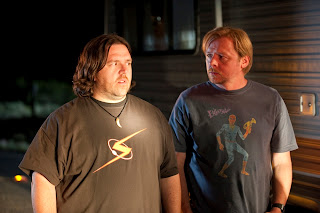I have literally just got back from the cinema after watching Paul (2011), the new Sci-Fi comedy from the team behind Hot Fuzz and Shaun of the Dead. Stars of those afore mentioned films, Simon Pegg and Nick Frost, were on writing duties for this one, and despite the change of setting to America (And the lack of Director Edgar Wright, who co-wrote Fuzz and Shaun with Pegg, and directed both), their charm and englo-centricity still shines through.
I want to say ahead of time this film absolutely rocked my world, and cheered me up immeasurably. It was so much fun; a joy to watch; I felt like I was sitting down to watch a film with old friends in it.
Frost and Pegg play Sci-Fi fans/nerds Clive Gollings and Graeme Willy respectively. They are on holiday in America, where, after a visit to ComicCon, they take a road trip in an RV visiting UFO hot spots of America. While on route at night, a car crashes in front of them and when inspecting the wreck, they find it's driver, Paul (Voiced by Seth Rogen), an alien (Moulded on the popular 'Grey' species) who has just escaped from Area 51 and is attempting to to get to a certain national monument (Which I wont spoil for those familiar with Close Encounters of a Third Kind) to be picked by the mother ship.
Clive and Graeme agree to help Paul in his journey, unaware they are being pursued by a team of FBI agents (Jason Bateman, Bill Hader and Joe Lo Trugilo) Along the way they are forced to kidnap a staunch Christian woman, Ruth, with a deformed eye (Kirsten Wiig), who becomes Graeme's love interest.
I don't want to say much else about the film's proceedings as I'd rather you discover them for yourselves, suffice to say their are endless pleasant surprises and great lines (Ie in a scene where Ruth's crazed religious Father is vying for road space with an equally crazed Bill Hader, in pursuit of the escaping RV: Father: "I'm on a misson from God!"; "Tell him you failed!" cries Bill Hader, before promptly shooting the Father in the shoulder - don't fret, he lives!)
Paul is a great character; (Seth Rogen in top form) a sarcastic, easy-going stoner alien who dispenses wisdom to a jealous Clive and rattled Ruth, as freely as he adopts invisibility or brings dead birds to life for a snack. The CGI work on his character is great; he literally is just another part of the film, convincing and solid without being distracting or just for the sake of eye-candy.
A recent Empire review complained that there wasn't enough conflict between Clive and Graeme's character's at the start of the film - ala Fuzz and Shuan, where their character traits rubbed against each other - but they're missing the point: Clive and Graeme are meant to be good friends, simpatico, a strong bond BEFORE Paul enters their lives, it's then their secret rivalries come to the fore - i.e Clive's jealousy at Graeme seeming to always be the first to discover or experience something, first Babylon 5 and then Paul himself. Also the scenes where it's just Clive and Graeme on their own are so brief (ComicCon and few scenes on the road)that it really is a petty complaint.
A more valid complaint from my perspective is the overuse of swearing in the film; Kirsten Wiig's character Ruth gets released from her Christian values when Paul shows her his lifetime's knowledge via telepathy; having no moral compass to fall back on she decides, among other things, to swear her head off. While the device is amusing the first couple of times as she is an tragically ineffective swearer: "Fuck-a-roo, that was the best titty-farting sleep I have ever had"; after a while it just starts to grate and feel unnecessary. The fact that other characters like Jason Bateman's icy-cool agent have to start employing this device;"Motherfuckin' tittysuckin' two-balled bitch!" when he runs out of bullets in a scene; is doubly unwelcome and unfunny.
I suppose another complaint you could direct at the film is it's depiction of Christians as one dimensional, gun-totting, bible-thumping idiots in an all out war against Darwinism. It's a fair complaint, but I admire Frost and Pegg for at least taking a side and voicing their opinion, when they could have played it safe. Although it has to be said (And here I agree with Empire) they could have satirized the nerd-dom of ComicCon with a little more bite; they're brave when it comes to mocking Christianity but not their little fan base.
Overall though, there is so much heart, warmth, good humor and good film making to Paul that these are just minor complaints. Director Greg Mottola (Unlike Edgar Wright) does not impose his presence with attention-seeking devices, he keeps the shots simple allowing the charm of the performances to work their magic; only ramping things up in the thrilling chase scene involving a house explosion. Frost and Pegg are, as usual, brilliant - Frost perhaps getting a little bit lazy and studied at times - but they take more a back seat in this one and let their American co-stars have more of a presence.
I loved this film, it made my night; and to that enormous throng of peons waiting to see the latest mind-numbing installment of the Fast & Furious franchise, shame on you, you SO missed out on a great experience.
Reference:
http://en.wikipedia.org/wiki/Greys
http://en.wikipedia.org/wiki/Greys









